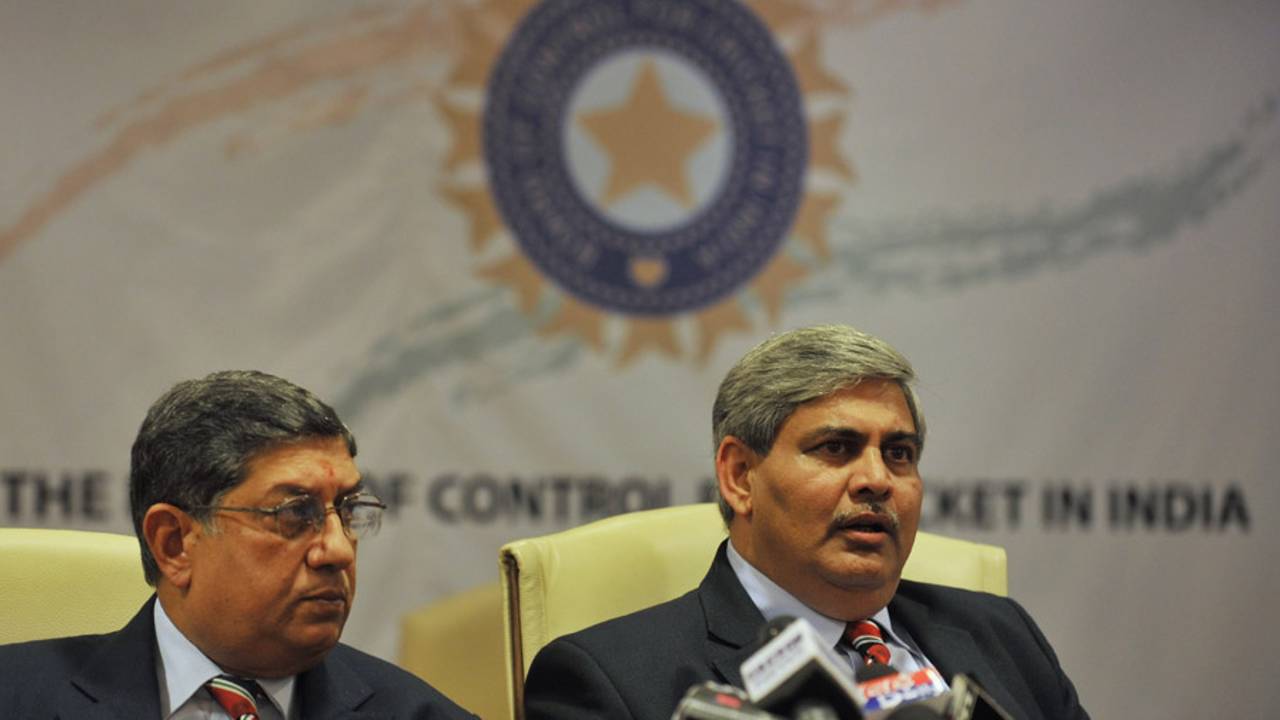Shashank Manohar has managed that rare trick: occupying a high-profile position in cricket administration - arguably the most powerful job in world cricket - and yet remaining inscrutable and usually out of the media glare. He does not carry a cellphone, reluctantly uses his wife's when it is absolutely necessary to speak on the go, does not wear a watch and - rare for an Indian of his stature - prefers to drive himself.
He has managed one other trick few of his peers have: retaining his reputation even after so many years in public life. Manohar enters his second stint as BCCI president - his first was from 2008-11 - barely tarnished or seemingly bruised in any way by the events of his first. His has been the go-to name ever since the BCCI's current crisis first cropped up in 2013, in the wake of the IPL corruption case.
The son of a former advocate general of Maharashtra, Manohar (58) entered cricket administration in 1990, when he was elected on the managing committee of the Vidarbha Cricket Association. Six years later he took over as the VCA president, a post he held - with a two-year break - until his election as BCCI president. During these 12 years, he developed a sprawling new stadium in Nagpur and the cricket academy at the old ground.
Manohar came to national - and global - attention because of his partnership with N Srinivasan, which started with Manohar being appointed as a BCCI vice-president in 2004 and Srinivasan taking over as treasurer the next year. Each realised the worth of the other as an effective administrator and they made a formidable team as president and secretary from 2008 to 2011.
Foremost in their strategy was keeping the media at bay. There was hardly a press conference by any BCCI administrator; no press interviews from players; no selectors allowed to talk to the media. Their logic was simple: "Whether we talk to them or not, they will write only what they want to. So why should we give them details?"
Together, and with Lalit Modi running the IPL, they took the BCCI to the status of a billion-dollar organisation and far and away the most powerful cricket body. Those three years changed Indian and world cricket, the result clear for all to see today.
That period also had its problems, many of which came to prominence only after Manohar left office. He is often credited with acting swiftly on Modi's breaches of conduct and suspending him immediately after the IPL 2010 final. However, the fact that Manohar could not stop Modi flouting BCCI norms for almost 18 months after taking charge raised questions over his credentials as an able administrator.
Moreover, most of the major decisions the BCCI took under his presidency could yet cost the board dearly. After Modi's dramatic and controversial exit in 2010, the BCCI had terminated Rajasthan Royals and Kings XI Punjab on Manohar's instructions. However, the teams managed to get the decisions overturned in a court and returned to the IPL.
Similarly, the termination of Kochi Tuskers Kerala led to a court-appointed arbitrator recently asking the BCCI to pay the owners of the franchise INR 550 crore plus interest for four years at 18%.
And most importantly, the BCCI amending its constitution by inserting a backdated clause to allow its office-bearers to have a stake in IPL was also done during Manohar's term and when he was a member of the constitution review committee. So despite his clean image, Manohar appears to be a man of double standards when he blames Srinivasan for conflict of interest.
Having had a tendency to maintain utmost secrecy while working together, Srinivasan and Manohar calling each other names over the last two years may have come as a surprise to many, but not to some of Manohar's aides. As one of them revealed, the seeds of the verbal duel were sown soon after the IPL scandal broke in May 2013.
Srinivasan's response at the time was to defend his son-in-law Gurunath Meiyappan as a "cricket enthusiast" despite being arrested on betting charges. That prompted the board secretary Sanjay Jagdale and treasurer Ajay Shirke - both seen as officials with clean reputations - to call Manohar for his advice. Manohar is understood to have told both to act according to their conscience, adding, "if I were you, I would have quit". They quit soon after.
Srinivasan is then believed to have called Manohar and sought his advice. Manohar told Srinivasan to step down with immediate effect, punish the two teams, prove his innocence and come back stronger. Srinivasan disagreed and told Manohar he expected a friend to stand by him in an hour of crisis. Manohar told him he would not compromise on his principles.
That effectively ended their relationship, and though their recent sniping has been surprising for the public displays of emotion by two usually discreet men, the spat itself was not.
After a long spell out of the limelight, spending time with family in his familiar routine in Nagpur, Manohar is back in the hottest seat in cricket. The world has changed since he stepped down, public and media scrutiny of the game and its leaders has become more intense. The BCCI has responded in the past few months with a policy of greater openness. How Manohar fits into this - or fits this into his scheme of things - remains to be seen.
Amol Karhadkar is a correspondent at ESPNcricinfo
